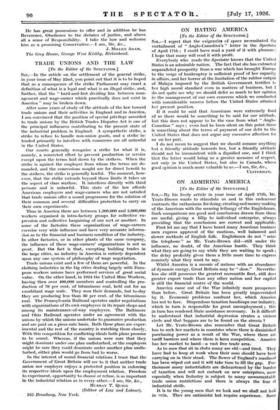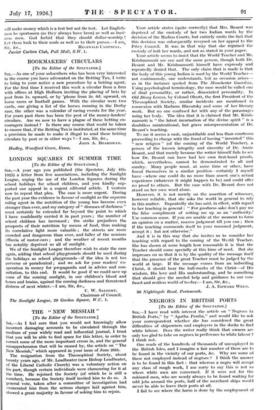ON ADMIRING AMERICA [To the Editor of the SPECTATOR,] Sin,—By
his lively article in your issue of April 17th, Mr. Yeats-Brown wants to stimulate us and in this endeavour contrasts the enthusiasm for doing, creating and money making of the American with the seeming lethargy of the Englishman. Such comparisons are good and conclusions drawn from them are useful, giving a fillip to individual enterprise, always providing that the conclusions are correct and applicable.
First let me say that I have heard many American business men express approval of the cautious, well balanced and slower methods of English folk. Englishmen do not " seize the telephone" as Mr. Yeats-Brown did—still under the influence, no doubt, of the American hustle. They think what they are going to say while they are waiting to speak ; the delay probably gives them a little more time to express concisely what they want to say.
Whilst America is a mosaic of nations with an abundance of dynamic energy, Great Britain may be " slow." Neverthe- less she still possesses the greatest mercantile fleet, still does greater export trade than any other nation and her capital is still the financial centre of the world.
America came out of the War infinitely more prosperous than before. Great Britain has been greatly impoverished by it. Economic problems confront her, which America has not to face. Stupendous taxation handicaps our industry, which in turn is responsible for great unemployment ; this In turn has rendered State assistance necessary. Is it difficult to understand that industrial depression creates a vicious circle and that beggars are to be found on the streets ?
Let Mr. Yeats-Brown also remember that Great Britain has to seek her markets in countries where there is diminished purchasing power as a result of the War, where there are tariff barriers and where there is keen competition. - America has her market to hand—a vast free trade area.
As to men that sit in clubs many are eld—and tired. They have had to keep at work when their sons should have been carrying on in their stead. The flower of England's manhood has been wiped out and it will take time to fill the gap. Fur- thermore many industrialists are disheartened by the burden of taxation and will not embark on new enterprises, more especially when Industry is subject to many unwarrantable trade union restrictions and there is always the fear of industrial strife.
It is to the young men that we look and we shall not look in vein. They are ontimistic but require experience. Sonic will make money which is a test but not the test. Let English. men be sportsmen (as they always have been) as well as busi- ness men. God forbid that they should dollar-worship ! Let them look to their souls ns well as to their purses.-1 ani,











































 Previous page
Previous page